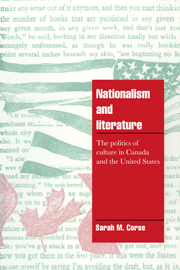Book contents
- Frontmatter
- Contents
- List of tables
- Acknowledgments
- 1 Introduction: cultural fields and literary use
- 2 Nation-building and the historical timing of a national literature in the United States
- 3 Nation-building and the historical timing of a national literature in Canada
- 4 The canonical novels: the politics of cultural nationalism
- 5 The literary prize winners: revision and renewal
- 6 The bestsellers: the economics of publishing and the convergence of popular taste
- 7 Literary meaning and cultural use
- Appendix A The canonical novels
- Appendix B The literary prize winners (1978–1987)
- Appendix C The bestsellers (1978–1987)
- Appendix D Coding sheet
- Appendix E Generic categories
- References
- Index
5 - The literary prize winners: revision and renewal
Published online by Cambridge University Press: 11 May 2010
- Frontmatter
- Contents
- List of tables
- Acknowledgments
- 1 Introduction: cultural fields and literary use
- 2 Nation-building and the historical timing of a national literature in the United States
- 3 Nation-building and the historical timing of a national literature in Canada
- 4 The canonical novels: the politics of cultural nationalism
- 5 The literary prize winners: revision and renewal
- 6 The bestsellers: the economics of publishing and the convergence of popular taste
- 7 Literary meaning and cultural use
- Appendix A The canonical novels
- Appendix B The literary prize winners (1978–1987)
- Appendix C The bestsellers (1978–1987)
- Appendix D Coding sheet
- Appendix E Generic categories
- References
- Index
Summary
Where so many are excluded from access to our most distinguished literary decorations, what is wrong?
Carlos Baker (1957: 63) in questioning the large number of “distinguished writers” who never won a Pulitzer.The National Book Awards were founded in 1950 in response to widespread dissatisfaction with the Pulitzer fiction winners; the National Book Critics Circle Awards were founded twenty-five years later in response to widespread dissatisfaction with the National Book Award winners.
James F. English (1993: 17) in his introduction to “An Economy of Prestige: Literary Prizes and the Circulation of Cultural Value.”The inclusion of contemporary Canadian and American literary prizewinning novels serves several purposes in this analysis. Most importantly, the analysis of prize winners provides a test of the competing unconscious-reflection-of-national-character and conscious-construction-of-national-identity arguments. The traditional reflection-of-national-character argument would expect contemporary high-culture literature to exhibit the same core cross-nationally distinctive characteristics as canonical literature since both types of literature are seen as reflecting natural national differences. An argument locating cross-national literary difference in the conscious construction of a unique nation, on the other hand, would not necessarily expect similar differences. Current literary prize winners, after all, are not contemporaneous with the nation-building process in the United States and Canada nor does their designation as worthy of a literary prize carry quite the same cultural authority as selection into the canon.
Second, the prize winners provide a comparison between Canadian and American high-culture texts that is unencumbered by period effects.
- Type
- Chapter
- Information
- Nationalism and LiteratureThe Politics of Culture in Canada and the United States, pp. 97 - 128Publisher: Cambridge University PressPrint publication year: 1996

